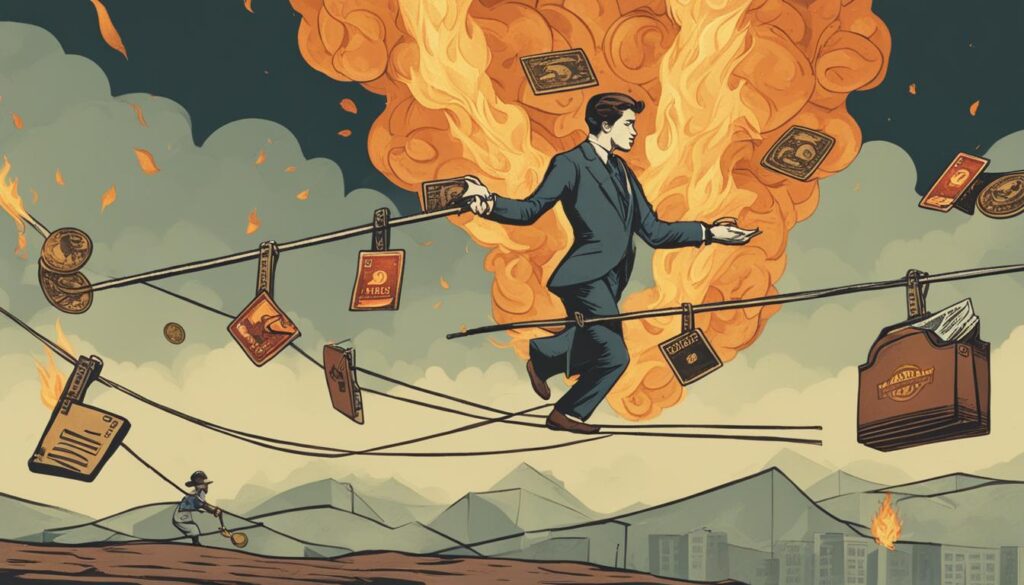Procrastination in budgeting can be a real challenge for many individuals. It’s not just about managing time, but also about dealing with the emotions and negative moods that arise when facing financial tasks. Boredom, anxiety, frustration, and self-doubt often contribute to our tendency to procrastinate in managing our finances. However, it’s important to remember that procrastination is not a personal flaw but a common response to emotional difficulties.
In this guide, we will explore effective strategies to help you overcome procrastination in budgeting and take charge of your financial situation. By understanding why we procrastinate and implementing realistic schedules, commitment, and budgeting basics, even the most notorious procrastinators can achieve financial stability. Let’s dive in!
Key Takeaways:
- Procrastination in budgeting is often a response to emotional difficulties.
- Understanding the reasons behind procrastination can help overcome it.
- Setting realistic schedules and commitments can boost productivity.
- Tracking income and expenses is essential for effective budgeting.
- Budget hacks, like using money management apps, can simplify the process.
Understanding Why We Procrastinate
Procrastination is a common behavior that affects many individuals, even when they are aware of the negative consequences it may bring. It is often a coping mechanism used to avoid uncomfortable feelings or thoughts associated with challenging tasks or responsibilities. By understanding the underlying reasons behind procrastination, we can begin to develop effective strategies to overcome it.
One of the main reasons we procrastinate is decision avoidance. When faced with a task that requires making difficult choices or important decisions, we may choose to delay taking action. This can be due to fear of making the wrong decision, uncertainty about the outcome, or a desire to avoid the discomfort associated with the task. By recognizing decision avoidance as a key factor in our procrastination, we can work towards developing better decision-making skills and improving our ability to take timely action.
Time management also plays a significant role in procrastination. Many individuals struggle with prioritizing tasks and allocating their time effectively. This can lead to a feeling of being overwhelmed, resulting in a tendency to delay tasks or push them aside. By learning effective time management techniques and developing a clear plan for our daily activities, we can better allocate our time and overcome the urge to procrastinate.
“Procrastination is the art of keeping up with yesterday.” – Don Marquis
Procrastination can also serve as a coping mechanism for dealing with challenging emotions and negative moods. Tasks that trigger boredom, anxiety, insecurity, frustration, resentment, or self-doubt may be put off to avoid experiencing these uncomfortable emotions. By addressing the underlying emotional difficulties and finding healthier ways to cope with them, we can reduce the need to procrastinate as a means of emotional regulation.
| Reasons for Procrastination | Effects on Productivity |
|---|---|
| Decision avoidance | Delays progress and leads to rushed decision-making |
| Time management difficulties | Leads to poor task prioritization and decreased productivity |
| Coping mechanism for challenging emotions | Can perpetuate negative emotions and hinder personal growth |
Understanding the reasons behind our procrastination can empower us to make positive changes in our behavior. By addressing decision avoidance, improving time management skills, and finding healthier ways to cope with challenging emotions, we can overcome procrastination and improve our overall productivity and well-being.
Setting Realistic Schedules and Commitment
Time management is a crucial aspect of overcoming procrastination and improving productivity. By setting realistic schedules and making a commitment to stick to them, procrastinators can effectively manage their time and accomplish important tasks without feeling overwhelmed.
Planning and Prioritizing
One key strategy for setting realistic schedules is to plan and prioritize your tasks. Start by identifying your most important and urgent tasks and allocate specific time slots for them in your schedule. Consider using a planner or digital calendar to keep track of your commitments and deadlines. By organizing your tasks and allocating sufficient time to complete them, you can avoid the stress of last-minute rushing and reduce the likelihood of procrastination.
It’s important to be mindful of your limitations and not overload your schedule with too many tasks. Be realistic about the time required to complete each task and allow for breaks or unexpected delays. By setting achievable goals and breaking larger tasks into smaller, manageable steps, you can maintain a sense of progress and motivation throughout the process.
Flexibility and Adaptability
While it’s important to commit to your schedule and stick to it as much as possible, it’s equally essential to be flexible and adaptable. Life is unpredictable, and unexpected events or emergencies may arise that require adjustments to your plans. Instead of viewing these changes as setbacks or failures, embrace them as opportunities to practice resilience and adaptability.
Remember that setting a realistic schedule doesn’t mean rigidly adhering to it at all costs. It’s about finding a balance between structure and flexibility. If necessary, reassess your priorities and make adjustments to your schedule accordingly. By being adaptable, you can navigate unexpected challenges while still staying on track towards your goals.
Tracking Progress and Reflection
To stay motivated and accountable, it can be helpful to track your progress and reflect on your accomplishments. Consider keeping a log or journal of your daily or weekly tasks, noting the ones you completed as planned and acknowledging any instances of procrastination. This self-awareness will allow you to analyze patterns and identify areas for improvement.
Celebrate your successes, no matter how small they may seem. Recognize the effort and discipline it took to complete tasks on time and acknowledge the positive impact it had on your overall productivity. Reflect on the times when you veered off track and consider what factors contributed to the procrastination. By learning from past experiences, you can develop strategies to prevent or minimize future instances of procrastination.

| Benefits of Setting Realistic Schedules | How to Set Realistic Schedules |
|---|---|
| 1. Reduces stress and overwhelm | 1. Prioritize tasks based on importance and urgency |
| 2. Increases productivity and efficiency | 2. Allocate specific time slots for tasks |
| 3. Improves time management skills | 3. Break large tasks into smaller, manageable steps |
| 4. Enhances accountability and motivation | 4. Be flexible and adaptable to unexpected changes |
Budgeting Basics for Procrastinators
When it comes to personal finance, procrastinators may find themselves overwhelmed and unsure of where to start. However, by focusing on the basics, you can establish a solid foundation for effective budgeting. Here are some key steps to get you started:
1. Keep track of your income and bills
The first step in budgeting is to have a clear understanding of your financial situation. Begin by tracking your income, including any regular paychecks, freelance work, or side hustles. Next, identify your monthly bills and expenses, such as rent/mortgage, utilities, transportation, and groceries. This will help you determine how much money you have available for other categories.
2. Create a spending plan
Once you have a clear picture of your income and expenses, it’s time to create a spending plan. This involves allocating your available funds to different categories, such as entertainment, dining out, clothing, and savings. Be realistic and prioritize your needs over wants. Remember, budgeting is about making intentional choices with your money.
3. Categorize your expenses
To stay organized and track your spending effectively, it’s important to categorize your expenses. This can be done using a simple spreadsheet or budgeting app. Common categories include housing, transportation, groceries, dining out, entertainment, and debt payments. By categorizing your expenses, you can easily identify areas where you may need to cut back or make adjustments.
By following these budgeting basics, you can lay the groundwork for better financial management. Remember, budgeting is an ongoing process that requires regular review and adjustment. Stay committed to tracking your expenses, making conscious spending decisions, and saving for the future. With time and dedication, you can overcome procrastination and take control of your personal finances.

| Category | Monthly Budget | Actual Spending |
|---|---|---|
| Housing | $1,200 | $1,250 |
| Transportation | $300 | $350 |
| Groceries | $400 | $450 |
| Dining Out | $200 | $150 |
| Entertainment | $100 | $75 |
| Savings | $250 | $300 |
| Total | $2,500 | $2,575 |
Table: Sample Monthly Budget and Actual Spending
Budget Hacks for Procrastinators
Procrastinators can utilize several budget hacks to simplify the budgeting process and effectively manage their finances. These hacks can help overcome the tendency to delay financial tasks and promote smart spending habits. By leveraging automated budgeting tools, money management apps, and strategic spending techniques, procrastinators can take control of their financial situation and achieve their financial goals.
The Power of Automated Budgeting
Automated budgeting can be a game-changer for procrastinators who struggle with tracking and organizing their expenses. By utilizing tools that automatically categorize expenses and track spending, individuals can save time and avoid the tedious task of manual data entry. These tools can provide real-time insights into spending patterns and help identify areas where adjustments can be made to improve financial health.
Money management apps are a popular choice for automated budgeting. These apps offer features such as expense tracking, bill reminders, and goal setting. They allow users to link their bank accounts and credit cards, ensuring that transactions are automatically recorded and categorized. Some apps even provide personalized recommendations based on spending habits, helping users make smarter financial decisions.
Practicing Smart Spending
Procrastinators can turn their tendency to delay purchases into an advantage by implementing a waiting period before making non-essential purchases. By giving themselves time to consider the necessity and value of a purchase, individuals can avoid impulsive buying decisions and save money in the long run. This technique can help separate wants from needs and promote mindful spending.
Another strategy for smart spending is to compare prices and seek out discounts or sales before making a purchase. Online shopping platforms often offer price comparison tools and notify users of any price drops or promotional offers. By taking advantage of these features, procrastinators can ensure they are getting the best deal and make informed purchasing decisions.

Summary
Budget hacks such as automated budgeting and smart spending techniques can empower procrastinators to overcome their tendencies and effectively manage their finances. By implementing these strategies, individuals can easily track their expenses, make informed financial decisions, and work towards their financial goals. The key is to embrace technology and leverage the resources available to simplify the budgeting process and promote responsible money management.
Taking Control of Your Financial Future
When it comes to financial security, planning for retirement is crucial. Procrastination in this area can have long-term consequences, making it important for individuals to take control of their financial future. By implementing effective strategies for retirement planning, managing debt, and ensuring financial security, even the most notorious procrastinators can secure a comfortable retirement.
“The best time to start planning for retirement was yesterday, but the second-best time is today.”
One of the keys to retirement planning is to start early. The earlier individuals begin saving for retirement, the more time their investments have to grow and compound. This can have a significant impact on the amount of money available for retirement and can help individuals avoid financial struggles in their later years.
In addition to saving for retirement, managing debt is also crucial for long-term financial security. Procrastinators should focus on paying off high-interest debt as soon as possible to avoid unnecessary interest payments. This can free up more money to put towards retirement savings and other financial goals.
Retirement Planning Tips:
- Start saving for retirement as early as possible
- Contribute to retirement accounts regularly
- Take advantage of employer-sponsored retirement plans
- Explore investment options to maximize returns
- Manage debt effectively to free up more money for retirement savings
By following these tips and taking control of their financial future, procrastinators can ensure a more secure retirement. It’s never too late to start planning for retirement and making positive changes to improve one’s financial situation. With discipline and a commitment to long-term financial goals, individuals can overcome procrastination and achieve financial stability.
Section Summary:
In this section, we discussed the importance of taking control of your financial future by focusing on retirement planning, managing debt, and ensuring financial security. Starting early and implementing effective strategies can help procrastinators secure a comfortable retirement and avoid unnecessary financial struggles in the future.
Conclusion
Procrastination in budgeting is a common challenge faced by many individuals. However, with the right strategies and a commitment to financial management, it is possible to overcome this tendency and achieve financial stability. By understanding the underlying causes of procrastination and implementing effective techniques, you can take control of your financial situation.
One key aspect of overcoming procrastination in budgeting is to start with the basics. By tracking your expenses and creating a budget, you can gain a clear understanding of your financial situation and make informed decisions. It is important to allocate your income wisely, ensuring that essential bills are prioritized and savings are allocated for long-term goals.
Implementing budget hacks can also be beneficial for procrastinators. By automating your budgeting processes and utilizing money management apps, you can simplify the task of tracking and categorizing your expenses. Additionally, delaying unnecessary purchases can help you save money and make more thoughtful spending decisions.
Remember, effective financial management requires discipline and dedication. Stay committed to your budget, regularly review and adjust it as needed, and seek professional advice when necessary. With these strategies in place, even the most notorious procrastinators can achieve financial success and secure their future.
FAQ
Is procrastination a time management problem?
No, procrastination is actually an emotion regulation problem. It is a way of coping with challenging emotions and negative moods induced by certain tasks.
What causes procrastination?
Procrastination can be caused by boredom, anxiety, insecurity, frustration, resentment, and self-doubt. It is often a way to avoid uncomfortable feelings or thoughts.
How can I overcome procrastination?
Setting a realistic schedule and committing to specific times and deadlines can help. Planning and prioritizing tasks, as well as making adjustments as necessary, can also increase productivity and avoid the guilt of procrastination.
Where should I start with budgeting?
It is best to start with the basics. This includes keeping track of income and bills, creating a spending plan, and categorizing expenses. Tracking every dollar spent and making adjustments to the budget as needed is important.
Are there any budget hacks for procrastinators?
Yes, there are. Money management apps can automate tracking and categorizing expenses. Automating bill payments can help avoid late fees. Procrastinators can also use their tendency to delay purchases by waiting a certain amount of time before making unnecessary purchases.
What are the long-term effects of procrastination on financial security?
Procrastination can have negative effects on financial security, especially when it comes to retirement planning. It is important to take control of your financial future by curbing impulse spending, saving for retirement, and managing debt effectively.
How can I overcome procrastination in budgeting?
By understanding the underlying causes of procrastination and implementing effective strategies, such as setting realistic schedules and using budget hacks, you can take control of your financial situation. Start with the basics, track expenses, and make adjustments as needed.
Can Following the Procrastinator’s Guide to Budgeting Help Reduce Stress?
Can following the Procrastinator’s Guide to Budgeting help reduce stress? By using this guide, you can learn to manage your finances better and alleviate the anxiety caused by poor financial planning. With its step-by-step approach, it enables you to tackle budgeting tasks at your own pace, ultimately bringing harmony to your wallet and peace of mind.

